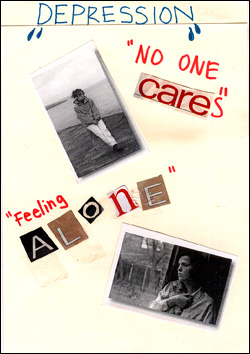Age 17 |
 |
 Emma, Age 17 |
We all feel down and depressed at some point in our lives. What you need to remember is that these hard times WILL pass and the next day will be better than the last, especially if you get treatment. Depression isn't just a bad case of the blues. It is an illness. There are plenty of resources out there that can be used by depressed girls. | |
| To see if you are depressed, or if someone you know is depressed, refer to the warning signs for depression (below), and see if they fit how you feel. If these symptoms keep you from enjoying your life, you should get professional help. By the age of 16, there is an increase in major depression in girls as compared with boys of the same age. Gay, lesbian and bisexual youth also have a higher incidence of depression because they don't feel like they fit in, and actually feel hated. Both girls and gay youth may have higher incidence of depression because of low self-esteem. Depression can get so serious that girls will have thoughts of suicide. If you are having suicidal feelings or if your friend or a girl you know has suicidal feelings, you should get help. Click on suicide above for more information. |
||
Warning Signs
|
 "Depression" by Emma Schutz Fort. |
|
Many of these warning signs are also signs of being suicidal. Suicide often occurs because of untreated depression. Treatment "Talk-Therapy" - This kind of counseling has shown to be helpful with most forms of depression. Therapy can be either short-term or long-term; can focus on behavior, thinking, feeling or some combination of the three; and can involve working one-on-one with a therapist, or as a participant in a group. Medicines / Medication - Many prescription drugs, which are now on the market, have proven to be effective in lifting most depressions. Some have unpleasant side effects, however, and you may need to try different types of antidepressants. You must see your physician in order to be prescribed these drugs.
How do the medicines work?
Antidepressants raise the level of serotonin in the brain and cause the brain to keep more of its own serotonin in circulation. Antidepressants are not stimulants or "mood-altering" drugs. They are also not addictive and have few serious side effects. Antidepressants help you to recover who you really are.
Medications are usually prescribed for a 6-12 month period. The effectiveness is evaluated on an on-going basis to decide about future treatment.
Helping A Friend
National Foundation for Depressive Illnesses (1-800-248-4344)
National Institute of Mental Health (1-800-421-4211)
National Mental Health Association (1-800-969-6642)
Some Sites to check out:
|
||